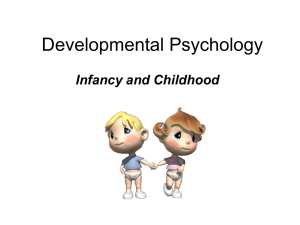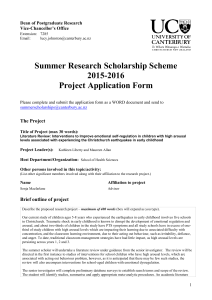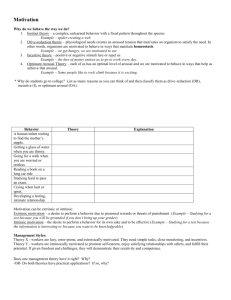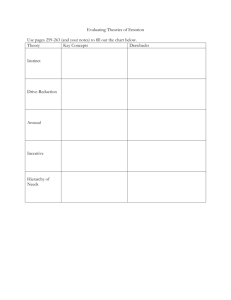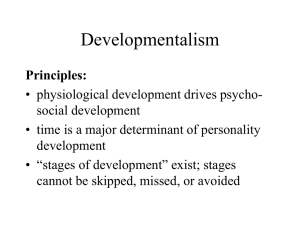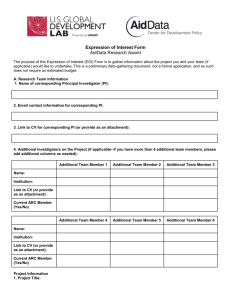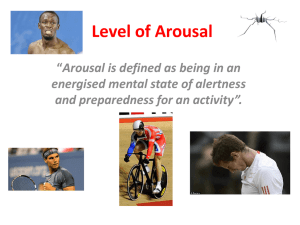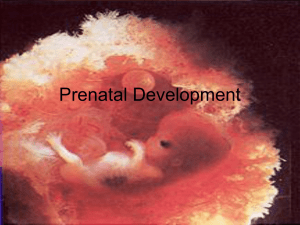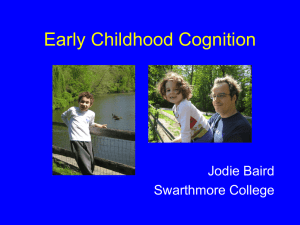CHAPTER 13
advertisement
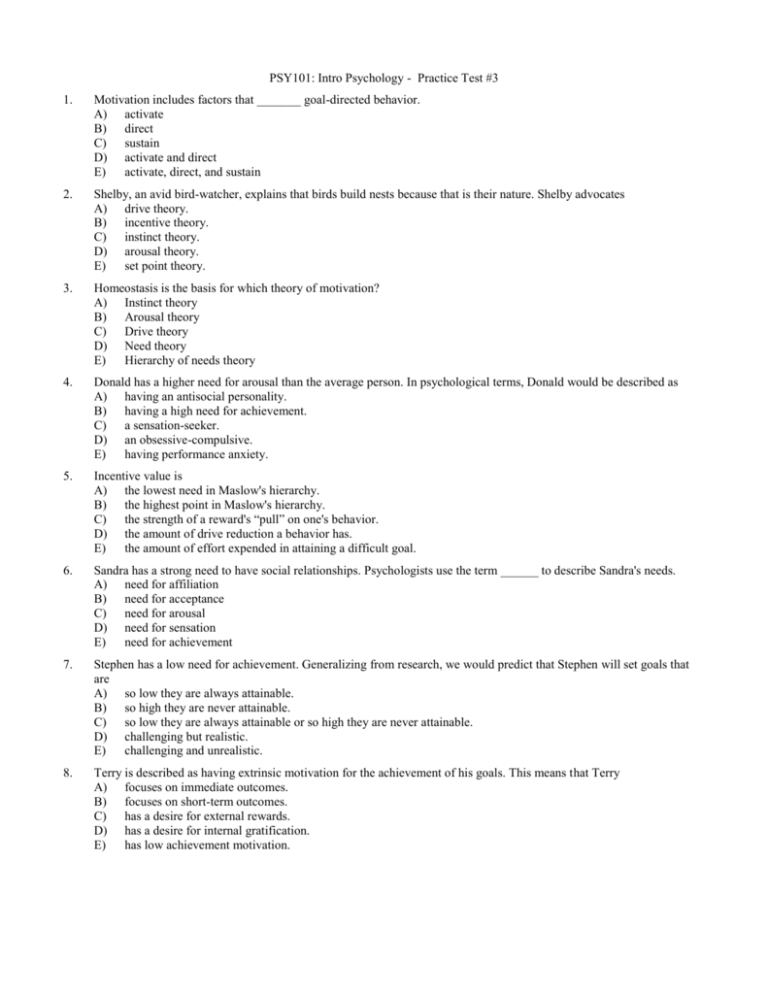
PSY101: Intro Psychology - Practice Test #3 1. Motivation includes factors that _______ goal-directed behavior. A) activate B) direct C) sustain D) activate and direct E) activate, direct, and sustain 2. Shelby, an avid bird-watcher, explains that birds build nests because that is their nature. Shelby advocates A) drive theory. B) incentive theory. C) instinct theory. D) arousal theory. E) set point theory. 3. Homeostasis is the basis for which theory of motivation? A) Instinct theory B) Arousal theory C) Drive theory D) Need theory E) Hierarchy of needs theory 4. Donald has a higher need for arousal than the average person. In psychological terms, Donald would be described as A) having an antisocial personality. B) having a high need for achievement. C) a sensation-seeker. D) an obsessive-compulsive. E) having performance anxiety. 5. Incentive value is A) the lowest need in Maslow's hierarchy. B) the highest point in Maslow's hierarchy. C) the strength of a reward's “pull” on one's behavior. D) the amount of drive reduction a behavior has. E) the amount of effort expended in attaining a difficult goal. 6. Sandra has a strong need to have social relationships. Psychologists use the term ______ to describe Sandra's needs. A) need for affiliation B) need for acceptance C) need for arousal D) need for sensation E) need for achievement 7. Stephen has a low need for achievement. Generalizing from research, we would predict that Stephen will set goals that are A) so low they are always attainable. B) so high they are never attainable. C) so low they are always attainable or so high they are never attainable. D) challenging but realistic. E) challenging and unrealistic. 8. Terry is described as having extrinsic motivation for the achievement of his goals. This means that Terry A) focuses on immediate outcomes. B) focuses on short-term outcomes. C) has a desire for external rewards. D) has a desire for internal gratification. E) has low achievement motivation. 9. The highest needs in Maslow's hierarchy are A) physiological needs. B) safety needs. C) esteem needs. D) self-actualization needs. E) love and belongingness needs. 10. Changes in blood sugar and circulating fats are detected by the A) hippocampus. B) thalamus. C) cortex. D) hypothalamus. E) amygdala. 11. In contrast to the lateral hypothalamus, stimulation of the ventromedial hypothalamus A) makes a hungry animal eat. B) makes an animal stop eating. C) has no effect on eating. D) makes a full animal start eating. E) restores homeostasis. 12. According to set point theory, when people lose weight A) food intake is increased. B) food intake is decreased. C) metabolic rate is increased. D) metabolic rate is decreased. E) stores of fat are released. 13. Anorexia nervosa is A) a form of food restriction that results in extremely low body weight. B) an eating disorder among individuals of relatively normal weight. C) a disorder in which episodes of binge eating are followed by purging. D) a major cause of obesity. E) equally prevalent in men and women. 14. The psychological sense of femaleness or maleness is called A) gender. B) sex. C) gender role. D) sexual orientation. E) gender identity. 15. During which phase of her sexual response cycle will Sasha experience an expansion and thickening of her vagina? A) Excitement B) Plateau C) Orgasm D) Arousal E) Resolution 16. Lately when Richard is having sex, he has been having difficulty achieving an erection. When he does have an erection, he often has trouble maintaining it. Richard most likely has which sexual dysfunction? A) Lack of sexual desire B) Premature ejaculation C) Erectile dysfunction D) Vasocongestion syndrome E) Duchenne syndrome 17. Which type of anxiety plays a key role in many cases of erectile dysfunction? A) Generalized anxiety B) Obsessive-compulsiveness C) Phobias D) Performance anxiety E) Anxiety from sexual trauma 18. What are the basic emotions that humans seem to be able to identify through facial expressions? A) Anticipation, anger, love, hate, boredom, and happiness B) Anger, love, hate, sadness, boredom, and happiness C) Anticipation, surprise, and fear D) Anger, fear, sadness, and happiness E) Anger, fear, disgust, sadness, happiness, and surprise 19. Happiness is LEAST likely to be found in which of the following? A) Development of strong spiritual or personal values B) Money C) Investment in family life D) Involvement in community life E) Meaningful work 20. The two-factor theory of emotion suggests that emotions A) occur simultaneously with bodily arousal. B) follow bodily arousal. C) are processed by two pathways in the brain. D) result from a combination of physiological arousal and cognitive appraisal. E) are universal across cultures. 21. Driving along a dark, rural road, Norma sees a deer jump across the road in front of her. Norma experiences physiological arousal, her heart pounding and her hands trembling. Norma realizes that she is aroused and says, “I'm terrified.” This characterization of Norma's emotional experience is most consistent with which theoretical model of emotion? A) Cognitive dissonance B) Two-factor C) Dual-pathway D) Cannon-Bard E) Facial feedback 22. The technical name for a lie detector test is a(n) A) electroencephalograph. B) electrocardiograph. C) polygraph. D) vasocongestion monitor. E) functional MRI. 23. What is the correct order of stages in prenatal development? A) Germinal, embryonic, fetal B) Germinal, fetal, embryonic C) Embryonic, germinal, fetal D) Embryonic, fetal, germinal E) Fetal, germinal, embryonic 24 In prenatal development, the umbilical cord connects the A) neural tube to the placenta. B) placenta to the amniotic sac. C) amniotic sac to the embryo. D) embryo and fetus to the placenta. E) embryo and fetus to the amniotic sac. 25. All of the following are examples of teratogens EXCEPT A) folic acid. B) lead. C) X-rays. D) mercury. E) infectious organisms. 26. Maternal smoking is associated with increased risk in the offspring with all of the following EXCEPT A) reduced attention span. B) deformed extremities. C) learning problems. D) behavioral problems. E) childhood asthma. 27. Of the five senses, which is the slowest to develop? A) Vision B) Hearing C) Touch D) Taste E) Smell 28. If his development is normal, newborn baby Moses can be expected to do all but which of the following? A) Hear a variety of sounds and be particularly sensitive to sounds falling within the frequency of the human voice. B) Discriminate among different tastes. C) Detect his mother's odor. D) Discern his mother's voice from other female voices. E) Differentiate various speech sounds. 29. A typical infant can stand without support by around A) 4 months. B) 6 months. C) 9 months. D) 12 months. E) 15 months. 30. Children who react negatively to change and are generally irritable are classified as having what kind of temperament? A) Resistant B) Insecure C) Avoidant D) Difficult E) Slow-to-warm-up 31. What type of infant temperament is generally associated with better adjustment in adulthood? A) Inhibited B) Slow-to-warm-up C) Difficult D) Easy E) Secure 32. The Strange Situation was developed to study A) imprinting in birds. B) attachment in monkeys. C) attachment in human infants. D) bonding with surrogate mothers. E) temperament of human infants. 33. Research examining the effects of full-time day care on infant attachment has found A) strong evidence that day care interferes with attachment. B) strong evidence that day care interferes with attachment, but only in high-quality day-care settings. C) mixed evidence regarding the effects of day care on attachment. D) no strong evidence that day care interferes with attachment. E) compelling evidence that day care enhances attachment. 34. Research on parenting styles suggests that the most effective parenting style is A) authoritative. B) authoritarian. C) permissive. D) secure. E) assertive. 35. Ten-month-old Kazik's parents are very sensitive to her needs. Whenever she cries, someone tries to comfort her. She will probably effectively resolve which psychosocial crisis? A) Autonomy vs. shame and doubt B) Initiative vs. guilt C) Trust vs. mistrust D) Industry vs. inferiority E) Identity vs. role diffusion 36. Toma is almost 5 years old. As he was struggling to learn to tie his shoes, his parents became exasperated with him and bought him shoes with Velcro closures. When he had trouble learning to ride a two-wheeler with training wheels, his parents made him go back to a tricycle. According to Erikson's theory, Toma may end up with a feeling of A) shame. B) guilt. C) mistrust. D) inferiority. E) doubt. 37. What is the correct sequencing of Piaget's stages of cognitive development? A) Concrete operational, sensorimotor, preoperational, formal operational B) Preoperational, concrete operational, formal operational, sensorimotor C) Sensorimotor, preoperational, formal operational, concrete operational D) Sensorimotor, concrete operational, preoperational, formal operational E) Sensorimotor, preoperational, concrete operational, formal operational 38. In Piaget's theory, the tendency to view the world only from one's own perspective is A) centration. B) authoritarianism. C) conservation. D) egocentrism. E) irreversibility. 39. In Vygotsky's terms, the range between a child's present level of skills and knowledge and their potential level of skills and knowledge with appropriate guidance is called the child's A) space of scaffolding. B) region of growth. C) zone of proximal development. D) zone of equilibrium. E) schema space. 40. The ability to solve abstract problems is characteristic of someone in which of Piaget's stages of cognitive development? A) Abstract operations B) Formal operations C) Concrete operations D) Preoperational E) Sensorimotor 41. According to the text, all but which of the following factors are associated with adolescent risk-taking? A) Hormonal influences B) The personal fable C) Having close friends who engage in risky behavior D) Impulsivity E) Strained family relationships 42. Moral reasoning based on conformity with social rules is characteristic of which level of moral development? A) Conventional B) Preconventional C) Postconventional D) Unconventional E) Formal operational 43. The stressful time of soul searching and self-examination that many adolescents experience is the A) identity crisis. B) inferiority complex. C) industry struggle. D) initiative crisis. E) personal fable. 44. If you are like the average person, you can expect to reach the peak of your physical performance in your A) late teens. B) twenties. C) early thirties. D) late thirties. E) early forties. 45. If Gertrude is like the average woman, she can expect to experience menopause in her A) late thirties or early forties. B) mid-forties. C) late forties or early fifties. D) mid-fifties. E) late fifties or early sixties. 46. Which hormones fuel a woman's sex drive? A) Androgens B) Estrogens C) Progesterone D) Corticosteroids E) Endorphins 47. Elvin is 75 years old. He is a rather sad because he regrets the wasted opportunities in life and feels he has made a lot of mistakes. From Erikson's perspective, this reflects a sense of A) despair. B) ego integrity. C) isolation. D) stagnation. E) generativity. 48 Sources of stress are called A) pressures. B) distress. C) anxieties. D) hassles. E) stressors 49. John was late for work after being caught in a traffic jam. Then he got caught in the rain walking from the parking garage to his office. John's experiences are best described as A) life events. B) trauma. C) hassles. D) anxiety. E) distress. 50. Which of the following statements is the best description of the relationship between life events and health problems? A) There is no relationship between life events and health problems. B) Life events increase health problems. C) Health problems cause life events. D) There is a small relationship between life events and health problems. E) There is a strong relationship between life events and health problems. 51. Which type of conflict will most likely cause feelings of ambivalence? A) Approach-approach B) Frustration C) Avoidance-avoidance D) Distress E) Approach-avoidance 52. Keisha suffers from posttraumatic stress disorder. Her primary symptom is being unable to relax and difficulty falling asleep. Keisha's symptoms are an example of which aspect of PTSD? A) Emotional numbing B) Avoidance of cues associated with the trauma C) Impaired functioning D) Reexperiencing the traumatic event E) Heightened arousal 53. The key element in Type A behavior pattern that appears to account for the increased risk for health problems is A) hostility. B) impatience. C) competitiveness. D) aggression. E) ambition. 54. Another name for the resistance stage of the general adaptation syndrome is A) adaptation. B) alarm. C) mobilization. D) exhaustion. E) stabilization. 55. During stress, corticotrophin-releasing hormone targets the ______, while adrenocorticotrophic hormone targets the _______. A) hypothalamus; pituitary gland B) pituitary gland; adrenal glands C) adrenal cortex; adrenal medulla D) adrenal medulla; adrenal cortex E) pituitary gland; hypothalamus 56. Antibodies are ______ produced by the immune system. A) specialized white blood cells B) specialized red blood cells C) specialized protein molecules D) foreign agents in the body E) hormones that help fight stress 57. Which of the following best describes self-efficacy? A) The ease with which one develops social support relationships B) One's ideal self-image C) One's belief that one is capable of accomplishing desired goals D) Self-assessment of one's general abilities E) One's ability to get things done without experiencing chronic stress 58. People with an external locus of control are _______ at coping with stress because they believe _______. A) better; they can control stressors B) better; there is nothing they can do about it C) better; their actions will be met with rewards D) poorer; they have to control everything E) poorer; there is nothing they can do about it 59. Seventy-five-year-old Louella tells her family she's been diagnosed with “hardening of the arteries.” What is the scientific name for Luella's condition? A) Artherosclerosis B) Diabetes C) Myocardial infarction D) Arteriosclerosis E) Hypertension 60. All but which of the following are suggestions in the text for successfully quitting smoking? A) Practice competing responses when tempted to smoke B) Mentally rehearse the benefits of not smoking C) Increase exposure to nonsmoking environments D) Limit the availability of cigarettes E) Set a date and try to quit all at once 61. High consumption of saturated fat is linked to what types of cancer? A) Prostate and colorectal B) Colorectal and breast C) Breast and skin D) Skin and brain E) Breast and prostate 62. Courtney has a sexually transmitted disease that causes frequent and painful urination, as well as lower abdominal pain. She contracted the disease from an infected sexual partner. It is the most common form of bacterial STD. Which STD does Courtney have? A) Gonorrhea B) Syphilis C) Genital herpes D) Chlamydia E) Genital warts 63. ______ is a state of physical and emotional exhaustion resulting from excessive job demands, caregiving, or other stressladen commitments. A) General adaptation syndrome B) Conflict C) Burnout D) Type A behavior pattern E) Frustration ANSWERS 1. E 2. C 3. C 4. C 5. C 6. A 7. C 8. C 9. D 10. D 11. B 12. D 13. A 14. E 15. B 16. C 17. D 18. E 19. B 20. D 21. B 22. C 23. A 24. D 25. A 26. B 27. A 28. E 29. D 30. D 31. D 32. C 33. D 34. A 35. C 36. B 37. E 38. D 39. C 40. B 41. A 42. A 43. A 44. B 45. C 46. A 47. A 48. E 49. C 50. D 51. E 52. E 53. A 54. A 55. B 56. C 57. C 58. E 59. D 60. E 61. A 62. D 63. C
